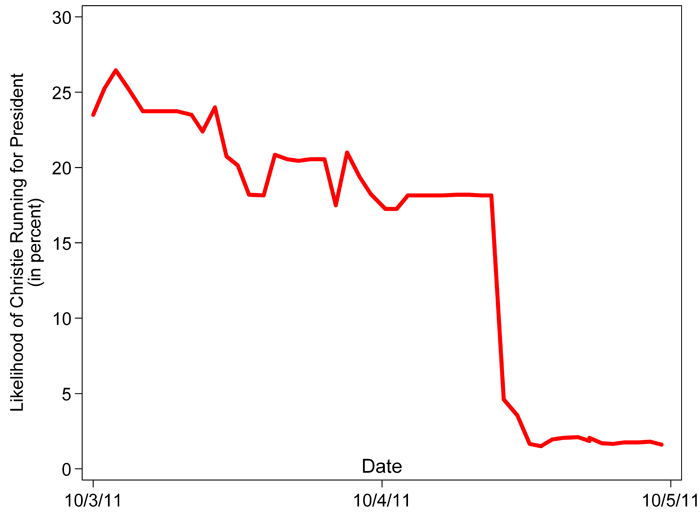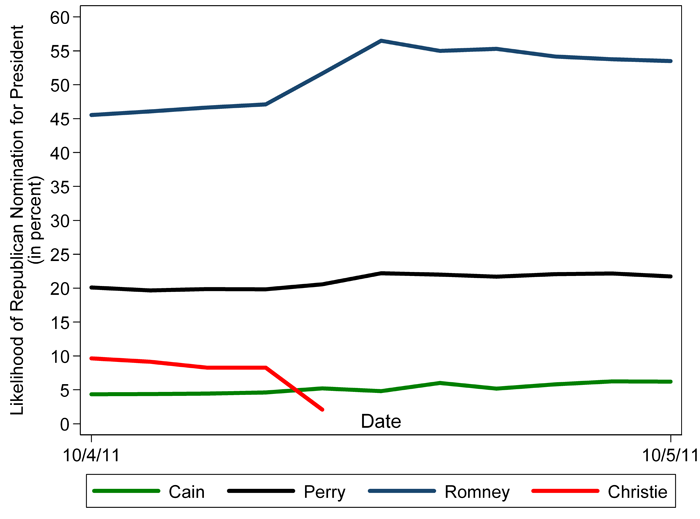 The Ticket
The TicketChristie’s non-entry is a Romney win
Governor Chris Christie of New Jersey announced on Tuesday that he was not going to seek the Republican nomination for president. Christie's news did not come as a complete surprise; despite his heavy flirtations, he still peaked at about 25 percent likelihood to run for president in Intrade's prediction market. That likelihood dissipated a little Monday and into Tuesday morning and then plummeted just before his press conference at 1:00 p.m. ET on Tuesday:
Despite the always-long odds against a Christie run, an actual Christie candidacy would likely create a big impact on the battle for the GOP nomination; even without entering the race, the markets forecast that he had a 10 percent likelihood of winning the nomination. Where did that 10 percent go when confirmed he was not running?
The short answer, shown in the chart above, is that Mitt Romney got most of it, and he got it fast. As Christie quickly headed toward a 1 percent likelihood of attaining the nomination, Romney jumped approximately 10 percentage points--from 45.3 percent to 55.3 percent likelihood, where he is right now. Many people saw Christie as the last major new Romney adversary, and his non-entry may be close the door on any other late challenge to the current field.
Rick Perry, meanwhile, experienced no bump in the wake of the Christie announcement. His likelihood of gaining the nomination has been relatively unchanged in the last few days. Christie was a strong moderate alternative to Romney--but the prediction markets are saying that Perry's position as the conservative alternative, whether it was to Romney or Christie, is unchanged. In other words, Christie was not a threat to Perry's position in the Republican field.
The markets were very accurate in predicting the aftermath of the Perry's third GOP debate a week ago Thursday. Within hours, they had Perry's likelihood of the Republican nomination falling fast, and Romney only gaining slightly. In the short term, the odds that Perry lost got transferred transferred to Christie and other longer-shot candidates. And over the past few days, opinion polling has begun to catch up with that prediction, with Romney staying very steady and Perry dramatically sliding.
The third major storyline for polls is Herman Cain's surge. The former Godfather's Pizza CEO approximately matches Perry--and the latest CBS poll shows Cain tied with Romney at the top of the field. His polling numbers moved upward from 7 in both the CNN and Rasmussen polls prior to last the last debate in Florida to 17 in all three polls after the debate (Fox, Quinnipiac, and ABC News/Wash Post). Perry moved down from 28 in both the CNN and Rasmussen polls to an average of 16.66 in the same three polls.
However, even though Cain is coming on strong, the prediction markets are skeptical. They grant him a 6.1 percent likelihood of snaring the Republican nomination, up from 4.4 percent Tuesday morning. That suggests that he's received a small bounce from Christie bypassing the race; the markets still handicap him as a longshot, but he is solidifying a position as the clear third-place contender. And despite the opposite trajectories and the similar polling numbers that Perry and Cain have lately experienced, the markets still give Perry nearly four times more likelihood of gaining the nomination.
So Tuesday's winner, in short, is Romney. He is the first Republican to have a greater than 50 percent likelihood of attaining the nomination--and that's a big milestone. Yet that also means there's still a 50 percent chance that someone else can seize the party standard. And a lot things can happen between now and the first primary, whenever that is.
David Rothschild is an economist at Yahoo! Research. He has a PhD in applied economics from the Wharton School of Business at the University of Pennsylvania. His dissertation is in creating aggregated forecasts from individual-level information. Follow him on Twitter @DavMicRot and email him at PredictionBlogger@Yahoo.com.



